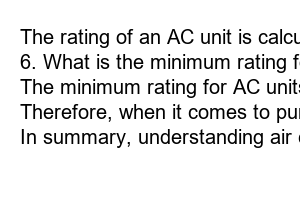에어컨 평수 계산
Air Conditioner Rating Calculation: A Guide to Understanding How It Works
With the heat in the summer months becoming more and more unbearable, air conditioners have become a staple in most homes. Whether it’s a window unit or a central air conditioning system, understanding the rating of your air conditioner is key to ensuring it works efficiently. The rating of your AC unit impacts its performance, efficiency, and the amount you pay for energy. Here is a guide on everything you need to know about air conditioner rating calculations.
1. What is a SEER rating?
SEER stands for Seasonal Energy Efficiency Ratio. It is the measure of the cooling output of an air conditioning system compared to the energy used up over a season. The higher the SEER rating, the more energy-efficient the unit is.
2. What are BTUs?
BTUs refer to British Thermal Units. It is a measure of the amount of heat produced by an AC unit. The higher the BTU rating, the more powerful the unit.
3. What is EER rating?
EER stands for Energy Efficiency Ratio. It measures the efficiency of an AC unit at a specific temperature (usually 95 degrees). The higher the EER rating, the more efficient the AC unit is.
4. What is the importance of the rating?
Knowing the rating of your air conditioner allows you to choose the most efficient unit for your space and budget. It also impacts your energy bills since higher-rated units use less energy.
5. How is the rating calculated?
The rating of an AC unit is calculated by dividing the cooling output (BTUs) by the energy input (watts) over a specific period. The unit’s seasonal efficiency is calculated by dividing the total output of the cooling system in a year by the total electric energy consumed by the system over the same period.
6. What is the minimum rating for an AC unit?
The minimum rating for AC units in the United States is 13 SEER.
Therefore, when it comes to purchasing or choosing the right AC unit, pay attention to its SEER rating, BTUs, and EER rating. These three ratings determine how efficient and powerful your AC unit is likely to be. Be sure to take the time to understand the rating of an AC unit before making a purchase to ensure that the unit you choose is suitable for your space and energy-saving goals.
In summary, understanding air conditioner rating calculations is crucial to achieving an efficient cooling system that saves you money and works optimally throughout summer. The rating of your AC unit impacts how it functions and the energy used. It’s wise to consider the SEER rating, BTUs, and EER rating when purchasing or installing an AC system for the best results.

